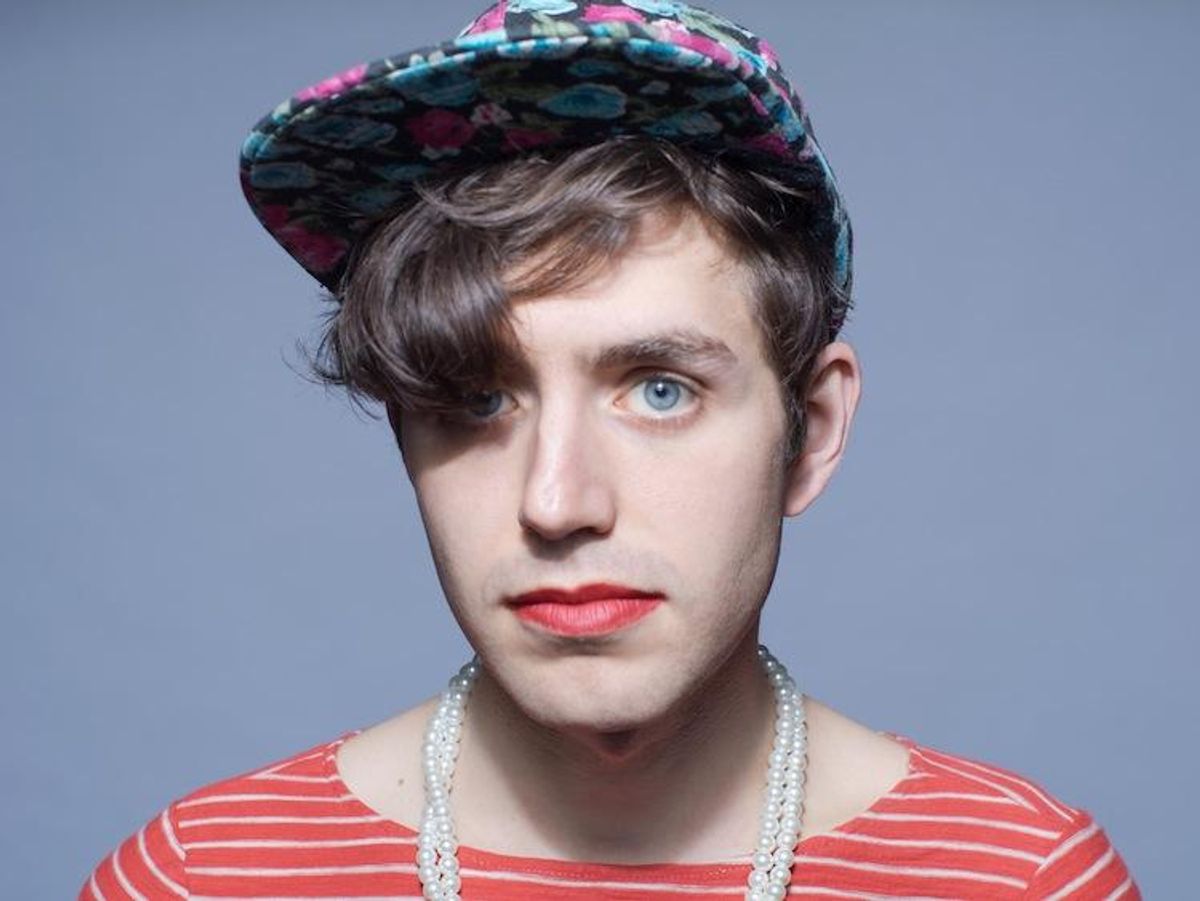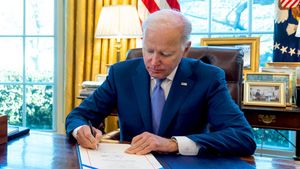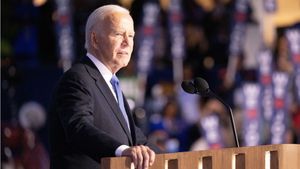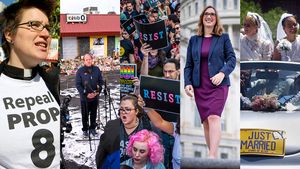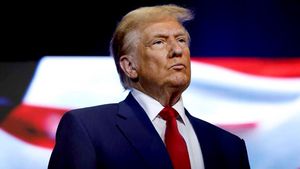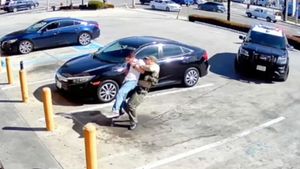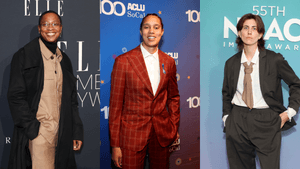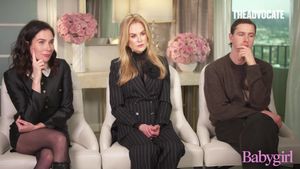Ezra Furman, the lead singer of Chicago's punk-rock band Ezra Furman & the Boyfriends, wore black shorts, a scarlet lip and string of iridescent pearls while thrashing about Coachella's stage during their mid-afternoon set on the festival's final day. Unlike almost every other band booked for Coachella's lineup, Furman's loudly, unabashedly and unapologetically queer. At the end of his set, he screamed, "Transgender power," and "Fuck AEG!"
Related | Downtown Boys Donate Portion of Coachella Paycheck to LGBTQ Organizations
Coachella has swirled in controversy this year after it surfaced that the owner of AEG, Philip Anschutz, who runs the operating company behind Coachella, had funded and supported various anti-LGBTQ organizations. To have a proudly queer performer playing in the festival then seems to be a strange, but important contradiction.
OUT sat down with Furman right after the band's set to discuss queer identity, activism, how music has new meaning in the age of Trump and what the fuck both of us were doing at an event ultimately owned by a homophobe.
OUT: The ending of your set at Coachella was really powerful, when you said "Fuck you" to AEG. What has your experience been like as a queer artist at the festival?
Ezra Furman: I haven't been here--I left right after my show the first weekend. And then I got here right before my set today. I've been running away.
How come?
For urgent religious reasons. I was going back to LA for the end of Passover. The kind of Jewish holiday where I don't drive, use electricity or use money. [It] may be unusual for a very out, queer person, [but] I'm very religious--although I know a lot of queer, religious Jews. With Coachella, regardless of queerness, there's something uncomfortable about a big, corporate festival. It's a thing I encounter a million ways, where art clashes with capitalism. Advertising is an old nemesis of mine. I'm a punk-rock musician.
How do you relate to the word, "Queer," and how it certainly doesn't fit into a capitalist, money-making machine? Has Coachella been kind to you?
Yeah, they have it all decked out in creature comforts; they give us food. I have had no interaction with Coachella's leadership, in any way, but a moral person will prickle at working for the man in this way. Coachella is owned, put on and financed by--"the man" is a funny cliche--but if there is a "the man," it is Philip Anschutz, which owns AEG, which owns GoldenVoice, which runs Coachella. So that's a little uncomfortable. I know a lot of people who would never do this and think I've sold out. But I think most people would say, "You're trying to make a living doing cool shit. You should take a pay check when you can."
You're also exposing audiences to a queer perspective, which is important.
I think that's right. To be visibly queer, and on the radical side, and a cool person--not all of our cultural bright lights are doing that.
How would you describe your queerness? In as simple terms as you'd like.
I think expanding LGBT to include a Q was done for someone exactly like myself. Because I don't think--well, I am a B, I'm bisexual--but I don't feel like I'm really on that list. And even if I wasn't bisexual, I'd still be queer. And I'm not a T, either. I don't think of myself as transgender.
I don't really know how I identify, but I don't think I care to know.
Yeah, the "I don't care" thing.
I just want to do me. Maybe that's stupid?
I don't think it's stupid. We're trained to say that. I think queering gender presentation is something that will make a lot of people go, "Oh, are you transgender? Because that's something I've heard of. What are you? Just a crossdresser? You're doing drag, or something." And it's like, "No. I think the word is queer." I feel much better dressing feminine, at least part of the time.
Right. It's not a performance all the time, it's just how I want to dress.
I've done a lot of thinking about what queer is. For personal reasons and because the word just keeps coming up in my life. I'm writing a book, actually, and I'm almost done--it's an entry in the Thirty Three and A Third series, which, there's like 100 of them, and they are all by different authors. They're books about albums.
What album are you writing about?
Transformer by Lou Reed. A lot of asking what that album's deal is is asking what it means to be queer. Lou Reed is really queer, and he also married three women over the course of his life. He often seemed totally male butch.
We're in a politically charged world with the Trump era. How do you think your work has changed since he became President?
It makes political engagement feel way more urgent. Before he got elected, innocent people were being killed. Things are already urgent. But it activated a lot of people who weren't active. It spurred me to be a better activist. That's the good part of it--because that activism was needed, whether or not Trump was elected. Institutionalized racism was already there. It's interesting how it changes me and my job as a performer. I think more people respond now when I say, "Try. Try. Don't be numb to this. We are here to give you energy to be the person you want to be, which I assume is being a more active citizen and a more moral person." That's what our band says. That's what we were saying before the Trump disaster. But people seem to respond more now. Or at least they cheer more.
Your band has an electric way of firing up the audience, like when you screamed, "Transgender power."
People will now call me trans, I suppose. I'm not mad to be called trans.
A lot of artists are being silent, right now. Which of your contemporaries are you applauding for their activism or music? Lady Gaga just performed last night...
I don't dislike her. Sometimes I do. I will never forget--I think I will always love her for when she appeared on MTV in a bloody wedding dress. I was really glad that happened. But Kendrick Lamar. To Pimp A Butterfly is maybe the best hip-hop album I've ever heard, or my favorite, anyway. Hip-hop has set me on fire before, but for me, Kendrick--someone that fucking good and that fucking charged and politically relevant in my lifetime--that's exciting. Also A Tribe Called Quest. I was inspired by PWR BTTM.
You remind me of PRW BTTM.
I was inspired by how at every venue they go to, they request non-gendered bathrooms.
Which is not an easily available option here at Coachella. How is it working in a band of all straight men?
I love them all, of course. But on tour, we performed with this band The Big Moon, who're all women. And I just realized how much of a relief it was to finally be around women. Not everybody realizes that to be in the all-cis, all-straight space is like having a grating static in the background that's always here. Everywhere you go--sometimes it turns down, sometimes it turns up--there's this heterosexualness that is just suffocating.
It's like a mosquito.
